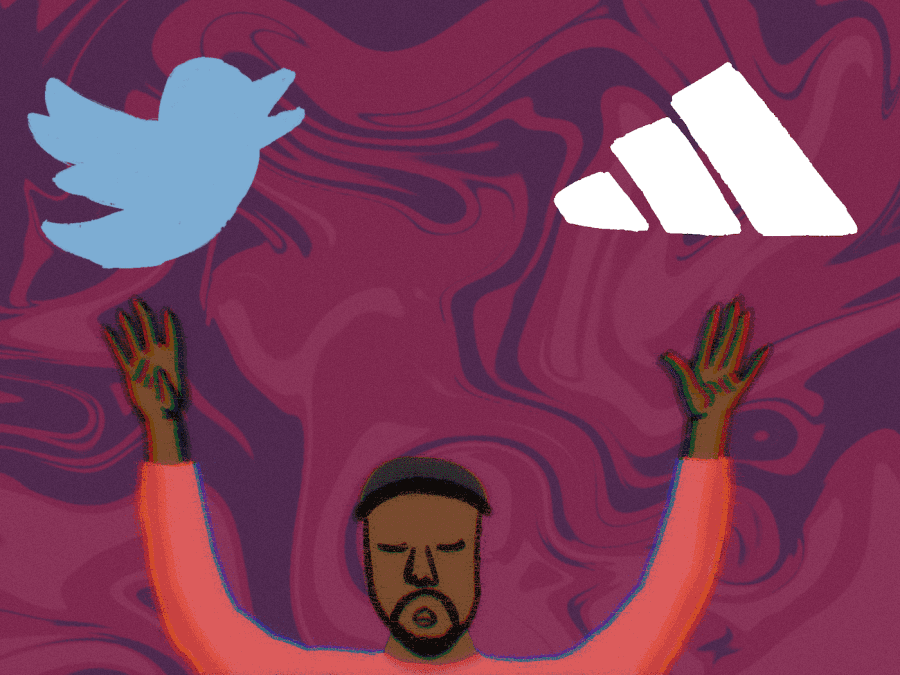For Kanye West, fame shouldn’t overpower accountability
The artist was recently banned from Twitter and Instagram after spewing antisemitic beliefs.
The artist formerly known as Kanye West sparked controversy after his comments about the Jewish community.
November 4, 2022
As I shuffle through my Spotify playlist, “Violent Crimes” by American rapper and fashion designer Kanye West, who now goes by Ye, starts playing. Instead of singing along as I usually do, I pause the music immediately. As a Jew, it is only natural to believe that it is also a violent crime to keep listening to Ye’s songs after his radical and unhinged antisemitic rants.
In a now-removed post from Oct. 8, Ye tweeted that he was going to go “death con 3 on JEWISH PEOPLE” in an apparent reference to DEFCON, a U.S. military defense readiness system. According to Ye, he couldn’t be antisemitic because all Black people are Jewish descendants.
I have been one of Ye’s followers since I was eight years old. Every single playlist of mine started with Ye as the first artist, because his music offered more than rap. It perfectly balanced a large assortment of styles, including hip-hop, soul, electro, indie rock and gospel. He was revolutionary — keyword “was.”
After posting antisemitic comments on both Twitter and Instagram, Ye was restricted from the platforms since he violated their policies. Fashion labels including Balenciaga, Adidas and the Creative Artists Agency terminated all business partnerships, collapsing his empire.
Antisemitism is nothing new for Jewish people — we have endured wars, a mass genocide and have been victims of infinite hate crimes. So I’m not surprised that another person is spreading hatred. The grave issue with Ye’s bigoted comments, however, is his immense platform of 31.7 million followers — more than double the number of people who self-identify as Jews today.
Jews comprise 14.6% of NYU’s undergraduate and graduate student body, and in an educational institution as diverse as ours, students are not hesitant to voice their opinions, no matter their race or religion.
“Absolutely, it was fair for Kayne to be removed from Twitter for his antisemitic comments,” SPS first-year Ananda Daniels told me. “I think that yes, people make these comments on the Internet all the time and Twitter does its best to remove them, but with Kanye, he has such a big platform and following, that Twitter noticed him sooner — along with others — and it’s his responsibility to handle his platform appropriately.”
In 2016, fans started to notice behavioral changes in Ye. Since then, he has been psychiatrically hospitalized and medically diagnosed with bipolar disorder. While his diagnosis may explain his behavior, it does not excuse it. Ye’s statements impact the identities of his followers, family, close friends and brand deals.
“Even though I don’t listen to Kanye, I think [his comments] are outrageous and ignorant,” Antonia Mendez, a Gallatin first-year, said. “It actually makes me less inclined to listen to his music because it feels completely unnecessary and out of the blue. I know he has a history of mental health issues, and I feel like there are so many headlines about Kanye that I am desensitized to whatever new thing comes out about him.”
The line between supporting an artist’s freedom of speech and demonizing a minority group is progressively thinning. Ye’s remarks are an overt threat to Jewish people, and while he will likely not be persecuted for his tweets, it will be ironic if his fame continues to exclude him from upholding civil responsibilities.
His comments are igniting the fire for right-wing violence and encouraging others to express their antisemitic sentiments. Members of the white supremacist Goyim Defense League hung banners over the Los Angeles 405 freeway that read “Kanye is right about the Jews,” and ferenced biblical proverbs, on Oct. 22. Groups like White Lives Matter and Nation of Islam have also been inspired by Ye’s remarks to create new propaganda campaigns.
“Kanye thinks he’s a god and that his words won’t have consequences, yet he has one of the biggest social media presences out there,” LS sophomore Lea Yael Setton said. “I am not surprised at his comments, but I was very bothered by them because he has no right to talk about another community that doesn’t involve him, especially when he is saying nasty things … I have lost respect for him and his work.”
Our community is strong, but restricted, in our united power for action and justice. We cannot combat hate with our own violence. At NYU, our community is supported by the Bronfman Center for Jewish Student Life, where students can gather and spread awareness for our culture and religion. In conversations with my own Jewish friends, opinions have been diverse — some thought Ye was being funny, and others weren’t surprised by his bipolar episodes. Some were outraged, while others didn’t care.
“He is hungry for attention and I feel like everything he does is extravagant and taken to the next level for money and fame,” Kailey McCabe, a CAS first-year and avid Ye fan, said. “People will still keep idolizing him no matter what and feed off of his psychoticism because of his willingness to show it.”
The claim that Ye is a misunderstood genius does not justify his actions. Society cannot keep excusing his behavior and allowing him to re-emerge every single time even more powerful than before. Now I am faced with a burdening internal conflict, and I would be deceiving myself if I said I would never listen to Ye’s music again — that is not realistic. However, I do choose to grieve the person he used to be.
Perhaps Ye should stop fallin’, dreamin’ and talkin’ in his sleep — the whole world is watching and those late-night thoughts have destroyed his entire reputation.
Contact Melissa Derzavich at [email protected].



























































































































































